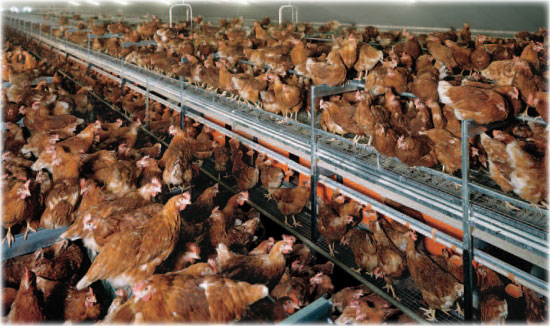笨狼发牢骚
发发牢骚,解解闷,消消愁
正文
中国 人逆来顺受,黑心食品常事,最有名的莫过于“地沟油”和“三鹿奶粉”。这是些例子:
《百度经验》舌尖上的315——真假食品大揭秘
《大纪元》大陸黑心食品外銷 印尼媒體曝7種假食物(知道很多人对大纪元有意见)
《百度百科》还来个大总结:
在美国,没有一个单独的黑心食品,这儿规章制度很严,能光天白日蒙大家的不容易,然而“黑心”“造假”不仅不是罕见,还是常规。
美国的”黑心食品“概成为食品作弊(Food Fraud),据报道
《食品和营养》2016.07.01
a study commissioned by the Grocery Manufacturers Association estimates certain types of food and consumer product fraud cost the global food industry $10 billion to $15 billion annually
每年给大家带来的损失100-150亿美元,不大不小吧。为什么美国西方制度这么严,消费者意识这么高还是有黑心食品?因为有利可图,正如《食品和营养》报道引用一位专家所说的:“哪有金钱,那就有罪恶;哪儿有大金钱,那就有大罪恶(Where there is money, there’s crime; where there is big money, there’s big crime)。”
《金融时报》2016.03.24
The fight against food fraud(介绍一个打击黑心食品的“尖端侦探实验室”)
“In former days, we had fake champagne, vodka, Johnnie Walker whisky. What we see now is day-to-day consumer goods, [things like] tomato juice and orange juice. You wouldn’t expect it for a low-priced item like tomato juice — for God’s sake, why would they fake it? The answer is people don’t expect it to be cheated, and the profit is very low, but people drink more tomato juice than champagne.”
Tomato juice is usually adulterated by diluting a famous brand name with a cheaper product. Chocolate, coffee and cookies are also targets.
资本主义。
有利有骗子,还有参与的双方甚至数方,那就是原材料农家,原产家、收购批发商运输公司,零售商。不是所有环节都参与,有时候超市、零售商参与,有时它们是受害者,譬如产家和收购批发运输串通一气,最后销售渠道成了受害者;有时连批发都被骗,甚至产家又被原材料收购、农产品公司骗了。总之是个复杂的情绪。但有一样是真的,那就是”黑心食品“不是个零头,不是能忽视的误差。
为什么有人觉得黑心食品有利可图?因为全球化,产业链错综复杂,极其庞大,很难追踪产品的所有参与者,《金融时报》提到的一个复杂运输渠道的例子:
So a fish that was “caught 50 miles off the north coast of Scotland has been to China, has been to South Korea, and probably been to a couple of countries in between. What arrives back in a port in Scotland is a 7.5kg block of fish and you’re told, ‘That’s cod.’” A number of different fish frauds can be committed — Elliott calls them the “sins of sea fish” — substituting species, bulking up fillets with salty water, switching bulk catch for line-caught labels, deceiving on quotas.
不过,除了复杂,还有利益。
有时黑心食品不仅仅是假食品,还是质量,大农业利益和老百姓利益的冲突。
美国大农业的利益你担心食品不知道哪来的,美国政府说不许知道,理由说不是不愿意,而是“世贸协议”。
美国公共电视台(PBS)前沿纪录片摄制组(Frontline)讲述美国西安一次沙门氏菌鸡瘟,最后追到俄勒冈州一家鸡农,是个大企业。
美国海德堡型沙门氏菌鸡瘟(Salmonella Heidelberg)(解说词)
讲的是美国大鸡农商Foster Farms如何百般逃避、抵赖、阻挠、设障,跟政府作对,用尽各种制度、法律机制漏洞重重设卡,还拒绝任何生产过程改进措施,因为改就得花钱,设备过程管控人员培训,花大钱。连调查人员指出他们安全检查数据有个致命之处:每间工厂都合格,加在一起就超标,产家还是拒绝接受,最后被政府拿出唯一(很难,以前每找到一个实例,大鸡农商就到法庭打官司,法官也没法子,只能说“证据不足”)的实例证据,才死死地认输。
真黑。
不过就黑心食品毒死人毒病人的还真不常见,但没毒死没吃病,难说没有被蒙了。对你每天购物买菜来说,最大的陷阱在哪儿呢?
各种各样黑心食品
下面是几个最常见的假食品(黑心食品)。
首轮冷轧橄榄油
都说首轮冷轧橄榄油(cold pressed extra virgin olive oil)健康,问题是美国对此管制很松,规定比欧洲低一个数量级,结果欧洲的质量很高,而美国的,尽管大量是“欧洲进口”,大部分都是水分,八成不合符标准,名牌也不例外。一个说法是加州小农庄邮购的质量最好,就是贵极了。
《食客》说,美国农业部和食品药物局都不担心,因为太难太大,没法管,干脆视而不见,等于没有(Neither the FDA nor the USDA are worried about stopping this, it’s too big of an issue)。
总而言之,你讲究“健康”,买来的说不定“极其不健康”。
海鲜
又是一个大忽悠。美国超市海鲜大多进口,南美,亚洲(越南菲律宾之类),不少是人工饲养(这个倒是明确标明)。不过大家不留意的是假货很多,“98 percent of the dishes tested actually contained another fish entirely”。就是说,鱼没有一包是货真价实的。例子:
a sushi restaurant in Santa Monica, California that was busted serving endangered whale meat as fatty tuna
用亚洲鲶鱼(Asian catfish)来替代鳕鱼(cod),比目鱼(flounder),石斑鱼(grouper),鲽鱼(sole)和红鲷鱼(red snapper)
海鲜造假,我知道最有名的案例是蟹肉饼。蟹肉饼(crabcake)是高档食品,一般人平时不多吃,下馆子吃吃倒是常见,但也是当头台。超市买的大多带填料(淀粉香菜类),也得十几元一磅,纯蟹肉饼值二十几块。美国最有名的螃蟹是马里兰蓝螃蟹(Maryland blue crab),产于切塞皮克湾(Chesapeake Bay),我年轻时到螃蟹收成期间常常远路开车赶过去吃螃蟹。总的说蟹肉饼价值高,油水大,产量不足,供不应求,大家创新的机会就来了。美国渔民厂家见到马里兰蓝螃蟹不够,大家还有急着买,那就用点“进口”泰国马来螃蟹冒充吧,大家也吃不出来。好了这都是些美国人。不过,还是真蟹肉,吃不出事。
2016.03.30
国际刑警组织(Interpol)/欧洲刑警组织
"More than 10,000 tonnes and one million litres of hazardous fake food and drink have been seized in operations across 57 countries in an INTERPOL-Europol coordinated initiative to protect public health and safety"
反黑心食品专业
《大事大谈》2016.02.29
《大事大谈》讲到另一个例子:石榴汁(pomegranate)。美国以前没人喝,后来有个创业的决定开发,打响了大牌:POMWonderful

完全是广告、宣传、造势的结果,真的成了美国热门。《大事大谈》说随后石榴汁销售大增,但石榴产量没上去,可不是来了猫腻。
不久前美国作家Larry Olmsted新书上架,专谈黑心食品,说他是这方面的行家。
Real Food/Fake Food: Why You Don't Know What You're Eating and What You Can Do about

采访
因为红鲷鱼能卖高价,他说用亚洲鲶鱼(Asian catfish)替代红鲷鱼(red snapper)最赚钱。
另外一个我熟悉的例子是蜂蜜。在美国蜂蜜大部分是假的,都是中国来的,都加糖,美国收购零售都知道,都参与,因为便宜。后来似乎有些禁运抵制,中国人就跑到印度去,打着印度的旗号出口美国。总而言之乌烟瘴气。我买,挑着,幸好很少吃。
据密歇根大学说,全球黑心食品市场总值高达300-400亿美元。餐馆更是一团糟,餐馆老板蒙的动力很大,没人管,也无法监控,我觉得我到外面吃海鲜吃鱼,不可能吃出假来。
按照“海鲜作假”,“哪儿油水大哪钱多”的想法,一个大目标是日本寿司。"I hate to tell you this," journalist Larry Olmsted said over the phone, "but the sushi you are ordering is probably fake, or at least mislabeled. And I wouldn't eat it."
其它媒体对该书的评论:
我列了几样大的:松露油(Truffle oil),香槟酒(Champagne),藏红花(saffron)香料,草喂牛肉(Grass-fed beef)和咖啡(末)。这些都在嫌疑名单上:
High-Value Foods
Cage-free eggs. Upscale wines. Ground coffees. Vanilla extract. Nutrient-rich “superfoods” of the moment (pomegranate juice, for example). Organic anything. Certain products like these that are in high demand and short supply often command a premium price tag. At the same time, higher price points make them ripe for manipulating, particularly when changes to the products can be made that are too subtle to detect.
一般来说成品食品带假机会高,譬如整条鱼难作弊。
忽悠鸡蛋
鸡蛋(和鸡)是另一个忽悠食品,各种各样的“标准”,诸多宣传的手段。可是英文字眼往往跟实际含义大相径庭。这是一个总结。
《美国大众电台》
美国养鸡都在“工厂”里,鸡是四十来天从出生到屠宰场。蛋鸡略有不同,但养殖方式近似,都是在厂房里,连转身的余地都没有,头都伸不直,活着不如死了(如果鸡油脑子的话)。

| 意思 | |
| “新鲜”(Farm Fresh) | 忽悠(别闹了,没一年那么长) |
| “全天然”(All Natural) | 忽悠(放心,不是人造的) |
| “无笼”(Cage-Free) | 鸡不关在笼子里,但每只鸡只有一平方英尺 |
| “走地”(Free-Range) | 含义是“没笼子”,能出鸡栏在厂房内走走,难说有几分钟 |
| “无激素”(No Hormones) | 忽悠。法律禁止 |
| “无抗生素”(No Antibiotics) | 误导。美国蛋鸡目前用抗生素的不多 |
| “有机”(Organic) | 走地+有机饲料+无激素无抗生素,仅此而已 |
| “农场鸡”(Pasture-Raised) | 这是你要的真正的“走地鸡” |
“走地”,每天放出来几分钟就合符政府标准,不是在“农场”里走走,而是在“车间”里走走。有机鸡蛋更忽悠,专蒙“非有机不吃的”人。
【注】肉食鸡抗生素用的多。
总的不是那么可怕,但黑心食品还是潜伏在很多地方,尤其是加工(合成)食品,成分几十种,谁也不知道来源和可靠性,举个例子中国韩国杂货店里的鱼丸,都不知道成分是什么。据说龙虾肉是造假的热门,有龙虾肉身价大增,有赚的,一种带龙虾肉的食品除非你见到龙虾肉,不能信。留点意是非常必要的,最好是尽量避免。
评论
6ba6
2016-10-14 09:53:43
回复
悄悄话
非常感谢!龙虾丸就是用catfish 打的
pokemama
2016-10-14 07:47:43
回复
悄悄话
多谢,多写,写多些!
华丽的转身
2016-10-14 07:46:45
回复
悄悄话
揭露的好! 身边还真有非Organic食品不吃的人,也没见他们怎么健康,自己安慰自己罢了.
haiwaiyouzi
2016-10-14 06:43:11
回复
悄悄话
好好揭,大顶!
老马识途
2016-10-13 23:22:25
回复
悄悄话
好文。
登录后才可评论.




